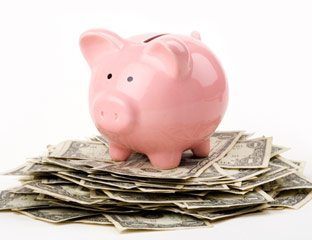How to Improve Your Investment Performance With an Emergency Fund
Want to know a secret?
An emergency fund can improve your investment performance. That’s why you should have one in place before you even start investing.
That sounds like a ridiculous idea, doesn’t it? After all, an emergency fund is designed to sit in a bank and collect dust (0.025% annual interest — and yes, let’s admit it — that’s basically just dust). How can it possibly improve your investment performance?
An Emergency Fund Allows For Higher Payoff
Diversification is a strategy that’s used to reduce investment volatility and add a measure of long-term stability to a portfolio. Though we tend to think of diversity primarily in terms of the asset allocation in a specific portfolio, in truth it extends to your entire financial life.
For example, let’s say you have a highly stable job working for the government — you’re in a position to take on higher risk/higher reward investments in your portfolio as a result of your employment stability.
Even if your investments suffer higher losses as a result of the higher risk, your personal loss will not be as great, simply because of your low-risk employment situation.
By contrast, if you’re a commissioned salesman, with an income that varies widely from year-to-year, you have to be far more conservative in your investment choices. You would not be able to absorb the combination of substantial losses in your investment portfolio during a year of low earnings.
Advertisement
But just as employment can have a material effect on how you invest your money, your financial situation beyond your investment portfolio can have the same effect.
If you have an emergency fund holding a sufficient amount of money to cover living expenses for 6 months or more, you’ll be in a position to invest more aggressively within your portfolio. In the event you have a bad year in your portfolio, your emergency fund will enable you to pursue higher risk investments without concern for your immediate financial survival.
An Emergency Fund Prevents Premature Selling of Assets
If you don’t have an emergency fund, you will be facing the prospect of having to liquidate investment positions in the event an emergency arises. And as anyone who has been in that situation knows, anytime you’re forced to sell investments, it will inevitably happen at the worst possible time!
What’s the worst possible time?
When the value of your investment has fallen significantly lower, than when you purchased it, or when the value of your investment has decreased, but is in major recovery. If you have to sell your investments and take a loss as a result, you will have converted what may be temporary investment losses into permanent ones.
Having an emergency fund will prevent you from prematurely selling your assets.
An Emergency Fund Offers Intangible Benefits
There are also non-tangible benefits to an investor who has a well funded emergency fund:
It allows you to maintain a stable budget flow. The financial issues that tend to bother us the most are the ones that are the most immediate in their impact. Such as, the threat of not being able to pay your bills in a given month, or meet an unexpected expense, could cause you to panic. Panic is not conducive to successful investing. An emergency fund will balance out your finances and keep you from panicking.
It helps you sleep better. If you have reasonable control over your finances — which an emergency fund will provide — you’ll sleep better at night because you will be less worried about what could go wrong within your investments. Better sleep leads to better health and a clear mind — all which help you to make sound investment decisions.
How Much Money Should Be In Your Emergency Fund?
The standard advice here is to save up anywhere from $1,000 to three months of living expenses in a savings account. I personally think, that if you plan to invest heavily, you have to go beyond the standard advice.

Six months worth of living expenses is probably the minimum you need, so you can comfortably ride out any short-term bumps along your economic road.
If you are in a higher risk career, give serious consideration to extending the reserve to 12 months of living expenses.
How to Quickly Build Up an Emergency Fund
I’m of the opinion that an emergency fund needs to be built quickly. The reason I say this is because when you build the fund slowly, emergencies may be coming up in the meantime that will block your efforts (like taking two steps forward and one step back).
You’ll save money gradually, sure, but you want to look for ways to fast forward the process:
Bank any windfalls you receive. This can be an income tax refund, a bonus check, or even gift money from a birthday or holiday.If bonus income or commissions above salary are a regular part of your compensation, direct these into your emergency fund as you receive them.Periodically sell off personal possessions on eBay, Craigslist or at yard sales. In the process of clearing out your home, you’ll be converting stuff you no longer use into cash.If you have any dormant stock or bond positions (i.e., inherited from Grandpa) outside of your investment portfolio, sell them and put the cash in your emergency fund.
There’s a secondary benefit to being able to build up an emergency fund quickly: The same strategies you used to build an emergency fund, can be used to increase your investment portfolio as well.
There’s more going on with emergency funds that most of us generally assume. But rather than thinking of it as a holding tank for unused funds, embrace the concept of leveraging it to improve your investment performance.
Have you ever thought of using an emergency fund as a functioning part of your overall investment strategy?
Leave a comment